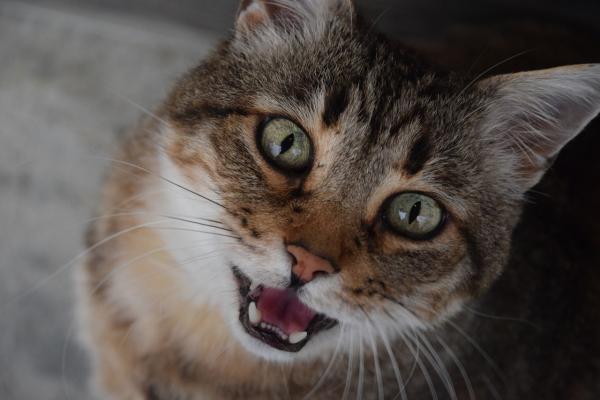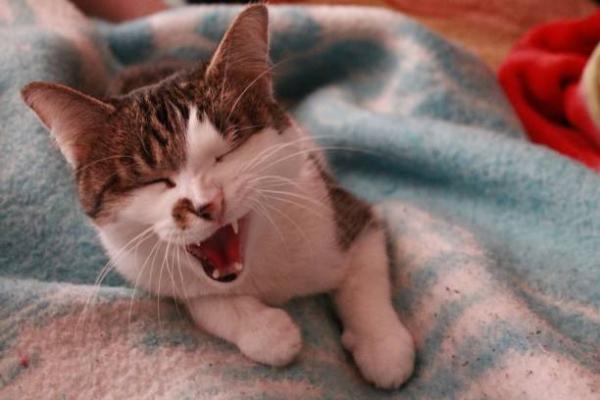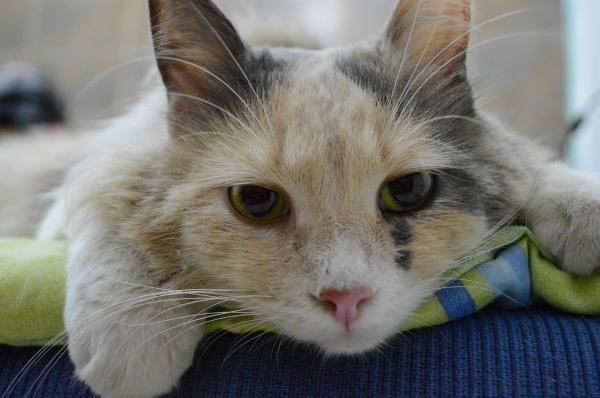Why does my cat cough a lot?

There are several causes that can lead to access to cough in cats. In this article we will review the main reasons that will allow us to answer the question of why our cat coughs a lot. By “a lot” we will understand several times a day, for several days, in a way that catches our attention, even if it does not alter the routine of the cat or manifest any other symptomatology. In any case, it is reason for veterinary consultation, so read on to discover why your cat does not stop coughing.
Cough in cats
As we have said, a cough at a specific moment should not be cause for alarm, it is when this situation is repeated that we should seek veterinary advice, as it may be due to different reasons. Generally, the cough is intended to expel some substance or foreign body from the body. If this is the case, we will see that the cat starts to coughing suddenly and continuously. The cough will present different characteristics according to its point of origin, and may have its cause in the throat or lung. Leaving aside the sudden coughing fits, let’s review the reasons that are most likely to explain why our cat coughs a lot.
Feline asthma
It produces a intensity and very variable periodicity. In some cats it is associated with an allergic reaction that can be to the desquamation of human skin. A reaction occurs where histamines and eosinophils are involved (it is a type of white blood cell that is related to allergic reactions and parasitic infections). Sometimes they occur, accompanying these coughs, episodes of apnea in which the cat is breathless. There is usually no other symptomatology. The diagnosis can be based on radiographs, which show a certain pulmonary pattern. A blood test can reveal, too, the level of eosinophils. In cases where allergy is suspected, it is possible to perform the corresponding tests.
The treatment of feline asthma will depend on the degree of involvement. Some cats will not need it, while for others, it will be essential to use inhalers. More serious cases may require oxygen therapy. As we see, the answer to why our cat coughs a lot is, in this case, in a respiratory difficulty at the pulmonary level.
Rhinotracheitis in cats
Rhinotracheitis is a very common and contagious viral disease among cats, especially in kittens that have not yet developed their immune systems, cats that carry the feline immunodeficiency virus, which detracts from their defenses, and cats that live in communities due to the ease with which it spreads. It is produced by a herpesvirus and, in addition to cough, usually causes sneezing, nasal and ocular discharge, fever, lethargy and anorexia, since the mucus interferes with the sense of smell and this, together with the pain, prevents them from eating normally. When coughing, they stretch the neck in a characteristic posture.
There is no treatment for viruses, so only support measures can be prescribed that will include antibiotics to combat opportunistic secondary infections, fluid therapy for cases in which dehydration occurs, as well as complementary medications that the veterinarian deems necessary. It is very important to treat from the first symptoms, since this is a life-threatening disease. It is important to know that cats that recover are going to become carriers of the virus. This means that the rhinotracheitis will be able to explain why the cat coughs even though the disease has already passed.

Estróngilos
The strongyles are about worms parasites that, in one of the phases of their biological cycle, they invade the lungs of the cats, provoking a reaction that explains why our cat coughs a lot. Further, cough is usually his only symptom and reflects a moderate to severe infestation. This cough occurs both at rest and during moments of activity.
Cats usually contract these parasites by ingesting small animals. Most cases are asymptomatic and can be resolved without treatment, by the body’s own defense mechanisms. They can be diagnosed by direct observation under the microscope of a stool sample taken with the thermometer. When coughing, the cats swallow strongyles that end up in the digestive system and, consequently, in the feces. It is treated with an antiparasitic at the discretion of our veterinarian.

This article is merely informative, in .com we do not have the faculty to prescribe veterinary treatments or make any kind of diagnosis. We invite you to take your pet to the veterinarian in case of any type of condition or discomfort.
If you want to read more articles similar to Why does my cat cough a lot?, we recommend that you enter in our section of respiratory diseases.


